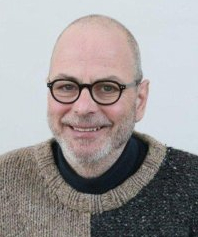Is massive online learning replacing the simple textbook? We at BCcampus think there is a bright future for Open Textbooks, and Thompson Rivers University economics prof Dr. Panagiotis (Peter) Tsigaris isn’t using expensive traditional textbooks in his introductory classes anymore. Instead, he’s turning students on to open educational resources and MOOCs.

MOOCs stands for Massive Open Online Courses. They’re free, open to everyone, and offered through agencies like Coursera, Saylor.org and the Khan Academy.
Three reasons why Tsigaris stopped using textbooks:
- Cost-savings for his students;
- Opportunity for his students to hear concepts explained in different ways; and
- Access to other experts in the field.
The changing role of a professor
“Suddenly I was questioning my role as a professor,” says Tsigaris. “Would my students really need me when the course content was available online from another institution? Would they stop attending class because they had already watched the videos?”
Tsigaris still kept his role at the front of the classroom, noting that students really benefited from having a professor who was able to interact and gauge their comprehension. He also told students he would give them three extra marks if they completed an entire MOOC. (Twenty-eight per cent of them did.)
Positive feedback means MOOCs are here to stay
Tsigaris estimates that by using open educational resources, each student saved about $120. A post class survey revealed that 83 per cent of students liked not having to buy a textbook and confirmed the cost savings. Other positive comments included the value of online quizzes and the ability to stop, review and rewind lectures. The only negative critique came from students who preferred using a textbook due to their own limited access to a computer.
In the future, Tsigaris will offer “à la carte” course materials to accommodate the different student needs. Students will have the choice of buying a textbook—either printed or electronic—or using free online educational resources.
Using MOOCs enhanced his teaching style.
Using MOOCs to complement his teaching, and attending MOOCs as a student, has given Tsigaris a chance to see how other top educators teach. It didn’t change his teaching style but rather enhanced it. For example, he began using some of the testing mechanisms employed by MOOCs—in-class quizzes, assignments, “one-minute comment” papers, and participation in economic experiments.
Tsigaris likes attending MOOCs to learn about topics that are outside of his subject expertise. Currently, he is enrolled in two courses offered via Coursera a “Brief History of Human Kind” from the Hebrew University of Jerusalem and the “Science of Climate Change” from the University of Chicago
Notable quotes:
“There is no question in my mind that the printed textbook will die out soon.” – Dr. Panagiotis Tsigaris
“Although my use of MOOCs in the classroom will continue, I have no plans to record my own lectures. I tell my students that they don’t need to watch me again when they could be exposed to the views of other experts. Besides, when I am in the classroom, I am live. I am still a scarce and valuable commodity. It is not so easy to stop and rewind me.” – Dr. Panagiotis Tsigaris
“MOOC is the new textbook. Instead of saying, ‘Go read a text,’ it will be, ‘Go do a MOOC.’ And we’re going to use our classroom sessions to help with that rather than to spend a lot of time lecturing.” – Dr. David Finegold, senior vice president for lifelong learning and strategic growth, Rutgers University
Learn more:
- Download a PDF version of Peter Tsigaris textbook presentation
- BCcampus: Longtime Supporter of Open Online Learning (yes, MOOCs!)
- CBC documentary: “The MOOC”
- Slideshare: Incorporating MOOCS and Other Online Resources Into On-Campus Courses
- Google and edX Create a MOOC Site for the Rest of Us
- How to Convert a Classroom Course Into a MOOC
